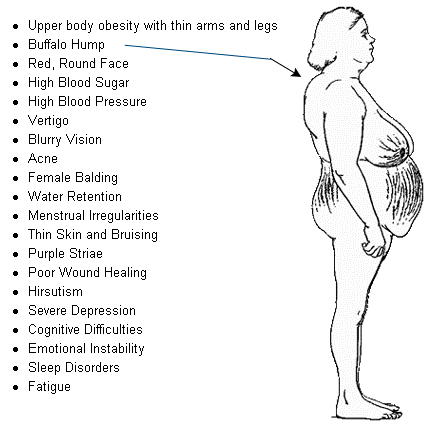Your patient is on long-term prednisone therapy. This patient should have frequent follow-up office visits to assess for which of the following?
Dermatitis and headaches
Heart failure and headaches
Hyperglycemia and osteoporosis
Weight loss and hypoglycemia
The Correct Answer is C
A. Dermatitis and headaches: Prednisone use can sometimes cause skin issues, but dermatitis is not a common side effect. Headaches can also occur, but they are not specific to long-term prednisone therapy.
B. Heart failure and headaches: Prednisone does not directly cause heart failure. Headaches can occur but are not specific indicators of prednisone side effects.
C. Hyperglycemia and osteoporosis: Prednisone can lead to elevated blood glucose levels (hyperglycemia) and increased bone loss (osteoporosis) when used long-term. Regular monitoring is essential to manage these potential side effects.
D. Weight loss and hypoglycemia: Prednisone can cause weight gain rather than weight loss. Hypoglycemia (low blood sugar) is not a common side effect of prednisone; it typically causes hyperglycemia (high blood sugar) instead.

Nursing Test Bank
Naxlex Comprehensive Predictor Exams
Related Questions
Correct Answer is A
Explanation
A. Ototoxicity and Nephrotoxicity:
Ototoxicity: Aminoglycosides can damage the inner ear structures, leading to hearing loss and balance issues.
Nephrotoxicity: These drugs can harm the kidneys, potentially causing acute kidney injury or chronic kidney disease. Monitoring kidney function is crucial to prevent renal damage.
B. Ototoxicity and Cardiotoxicity:
Ototoxicity: As mentioned above, aminoglycosides can damage the inner ear, affecting hearing and balance.
Cardiotoxicity: Aminoglycosides primarily affect the ears and kidneys; they do not directly target the heart. Cardiotoxicity is not a common side effect associated with aminoglycosides.
C. Hepatotoxicity and Nephrotoxicity:
Hepatotoxicity: This term refers to liver damage caused by drugs or toxins. Aminoglycosides are not known to cause liver problems; their primary concern is kidney damage.
Nephrotoxicity: As mentioned earlier, aminoglycosides can harm the kidneys, which is a well-known side effect.
D. Cardiotoxicity and Hepatotoxicity:
Cardiotoxicity: This term refers to the toxic effects on the heart, leading to various heart-related issues. Aminoglycosides do not primarily affect the heart; their main concerns are the ears (ototoxicity) and kidneys (nephrotoxicity).
Hepatotoxicity: Aminoglycosides are not typically associated with liver damage. They are primarily metabolized and excreted by the kidneys, which is why kidney monitoring is crucial during their use.
Correct Answer is B
Explanation
A. IgD: Immunoglobulin D (IgD) is found on the surface of B cells and serves as a receptor for antigen recognition during the immune response. Its exact function is not fully understood, but it plays a role in the activation of B cells.
B. IgE: Immunoglobulin E (IgE) is primarily associated with allergic responses and defense against parasitic infections. When an allergen enters the body, IgE antibodies trigger the release of histamine and other chemicals, leading to allergy symptoms. IgE is also involved in protecting against certain parasites.
C. IgG: Immunoglobulin G (IgG) is the most abundant immunoglobulin in the bloodstream. It provides long-term immunity by recognizing and neutralizing pathogens such as bacteria and viruses. IgG antibodies are involved in secondary immune responses and are transferred from mother to fetus, providing passive immunity.
D. IgM: Immunoglobulin M (IgM) is the first antibody produced during an initial immune response to an antigen. It is effective at agglutination (clumping) of pathogens. IgM antibodies are generally found in blood and lymph fluid and are the first line of defense during infections.
Whether you are a student looking to ace your exams or a practicing nurse seeking to enhance your expertise , our nursing education contents will empower you with the confidence and competence to make a difference in the lives of patients and become a respected leader in the healthcare field.
Visit Naxlex, invest in your future and unlock endless possibilities with our unparalleled nursing education contents today
Report Wrong Answer on the Current Question
Do you disagree with the answer? If yes, what is your expected answer? Explain.
Kindly be descriptive with the issue you are facing.
